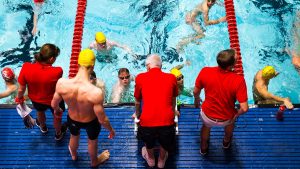 Swim England has announced all its remaining national events in 2020 have now been cancelled. The decision has been taken to allow the national governing body to start planning for its competitions in 2021. It will also ensure athletes do not rush back to full fitness and potentially put themselves at the risk of injury when pools are eventually reopened. Swim England had already called off events in all disciplines until the end of August because of the Covid-19 pandemic – which included the National Summer Meet.
Swim England has announced all its remaining national events in 2020 have now been cancelled. The decision has been taken to allow the national governing body to start planning for its competitions in 2021. It will also ensure athletes do not rush back to full fitness and potentially put themselves at the risk of injury when pools are eventually reopened. Swim England had already called off events in all disciplines until the end of August because of the Covid-19 pandemic – which included the National Summer Meet.
Now it has been confirmed the following national competitions will not take place:
- September: Swim England Open Water National Masters Championships (Nene Park, Peterborough).
- October: Swim England National County Team Championships (Ponds Forge); Swim England Masters National Championships (Ponds Forge).
- November: Swim England Water Polo National Age Group Championships U15s Finals (Ponds Forge); Swim England Artistic Swimming National Masters Championships (K2 Crawley); Swim England Masters Swimming Inter County Team Event (various venues).
- December: Swim England Winter Championships (Ponds Forge).
Plan for the future
George Wood, Swim England Director of Sport Development, said: “We know our athletes will be saddened to hear we’ve called off the remainder of our events this year – we’re extremely disappointed too. It was a decision we deliberated long and hard over but felt that with the current uncertainty still surrounding the Covid-19 pandemic, and with no knowledge as to when mass gatherings will be allowed, we were better off starting to prepare for next year’s competitions.”
He continued; “We appreciate open water swimming is currently taking place but it would be difficult to stage the National Masters Championships due to the social distancing measures that are in force. We hope our members, clubs and competitive athletes in all disciplines will all be back in pools soon, enjoying the sports they love. But we have to be realistic and understand that getting ready for competitive action isn’t something that’s going to happen overnight, which was also a factor in our decision. Now at least we can start to plan for the future.”
The issuing of event licences is currently suspended and will continue to be so until further notice. Any licences that have already been issued are provisional in status.
The Swim England Discipline Leadership Groups will publish guidance for the reintroduction of competition, licensed or otherwise in their respective discipline once appropriate information is known.
Meanwhile, the Swim England National Awards, which was scheduled to take place in November, has also been cancelled.




